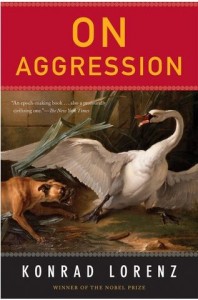 Are we naturally “aggressive?” What a way to greet the spring! Today’s headlines seem to indicate that we simply cannot avoid creating friction among human beings. This sent me backwards in time to re-read Konrad Lorenz’s monumental On Aggression, first published in German in 1963 and in English in 1966.
Are we naturally “aggressive?” What a way to greet the spring! Today’s headlines seem to indicate that we simply cannot avoid creating friction among human beings. This sent me backwards in time to re-read Konrad Lorenz’s monumental On Aggression, first published in German in 1963 and in English in 1966.
Lorenz defines aggression as, “the fighting instinct in beast and man, directed against members of the same species.” The forms, objectives and examples of aggression include:
- behavior
- preservation of the species
- physiology of instinctual motivation
- the process of ritualization
- how instinctive impulses function
- mechanisms evolution has “invented” to channel aggression to harmless paths
- social organization (“anonymous crowds”)
- bonds of “love and friendship”
- the “virtue of humility”
- counter-measures against the malfunctions of aggression (including examples among fish, birds and four-legged mammals).
He concludes: “aggression . . . is really an essential part of the life-preserving organization of instincts.” And our own-species aggression is “essential for its preservation.”
The “principle of the bond” seems to require some degree of aggressive behavior: we apparently need something in common to be defended against outsiders, such as territory, brood, opinion and, most dangerously, ideology. Aggression thus becomes “necessary to enhance the bond.”
And “ the danger to modern man arises not so much from his power of mastering natural phenomena as from his powerlessness to control sensibly what is happening today in his own society.”
Is there a ray of hope? Lorenz thinks it is possible.
First, our, “insatiable curiosity is the root of exploration and experimentation … a linking of cause and effect … the conscious foreseeing of the consequences of one’s action.” This “unrelenting demand for causal understanding” may well lead to a “scientific enlightenment [that] tends to engender doubt in the value of transitory beliefs long before it furnishes the causal insight necessary to decide whether some accepted custom is an obsolete superstition or still an indispensible part of a system of sacred norms.” Our inquiring minds may often be too far ahead of how we react!
And why are our young so often at the center of disruptive behavior?
Lorenz suggests an answer. “During and shortly after puberty, human beings have an indubitable tendency to loosen their allegiance to all traditional rites and social norms of their culture, allowing conceptual thought to cast doubt on their value and to look around for new and perhaps more worthy ideals … At the postpuberal age some human beings seem to be driven by an overpowering urge to espouse a cause and, failing to find a worthy one, may become fixated on astonishingly inferior substitutes.” Shades of the Middle East today, one might venture …
But he is, nevertheless, optimistic — Lorenz suggests some preventive steps to counter our natural aggressive instincts. First, he reiterates the famous Chilton/Socrates admonition to “Know thyself,” acknowledging some obstacles:
- unawareness of our evolutionary origin
- reluctance to admit that our “behavior obeys the laws of natural causation” (there is no “free will!”)
- a heritage of “idealistic philosophy”
His conclusion: “Truth, in science, can be defined as the working hypothesis best fitted to open the way to the next better one.” Nothing is “absolute!” And, finally, allow humor to play a major role: do not take ourselves too seriously.
There is nothing quite like stepping back in time to re-read some earlier thoughts …
 About the author: Felix Kloman is a sailor, rower, husband, father, grandfather, retired management consultant and, above all, a curious reader and writer. He’s explored how we as human beings and organizations respond to ever-present uncertainty in two books, ‘Mumpsimus Revisited’ (2005) and ‘The Fantods of Risk’ (2008). A 20-year resident of Lyme, he now writes book reviews, mostly of non-fiction that explores our minds, our behavior, our politics and our history. But he does throw in a novel here and there. For more than 50 years, he’s put together the 17 syllables that comprise haiku, the traditional Japanese poetry, and now serves as the self-appointed “poet laureate” of Ashlawn Farms Coffee, where he may be seen on Friday mornings. His wife, Ann, is also a writer, but of mystery novels, all of which begin in a bubbling village in midcoast Maine, strangely reminiscent of the town she and her husband visit every summer.
About the author: Felix Kloman is a sailor, rower, husband, father, grandfather, retired management consultant and, above all, a curious reader and writer. He’s explored how we as human beings and organizations respond to ever-present uncertainty in two books, ‘Mumpsimus Revisited’ (2005) and ‘The Fantods of Risk’ (2008). A 20-year resident of Lyme, he now writes book reviews, mostly of non-fiction that explores our minds, our behavior, our politics and our history. But he does throw in a novel here and there. For more than 50 years, he’s put together the 17 syllables that comprise haiku, the traditional Japanese poetry, and now serves as the self-appointed “poet laureate” of Ashlawn Farms Coffee, where he may be seen on Friday mornings. His wife, Ann, is also a writer, but of mystery novels, all of which begin in a bubbling village in midcoast Maine, strangely reminiscent of the town she and her husband visit every summer.